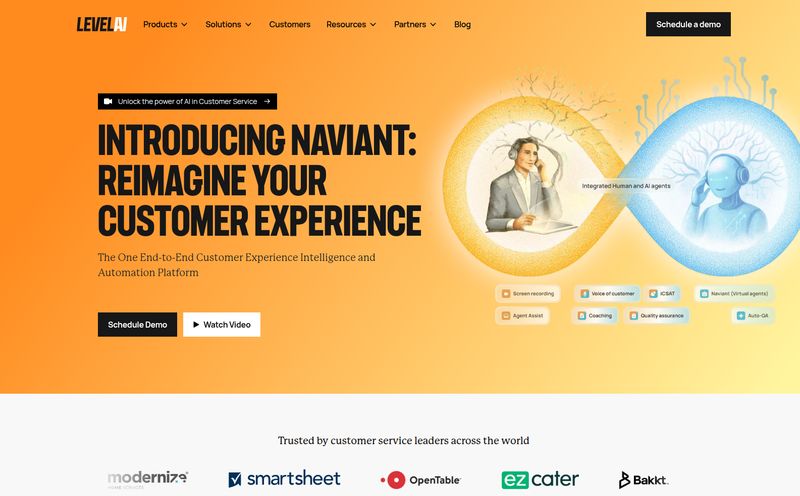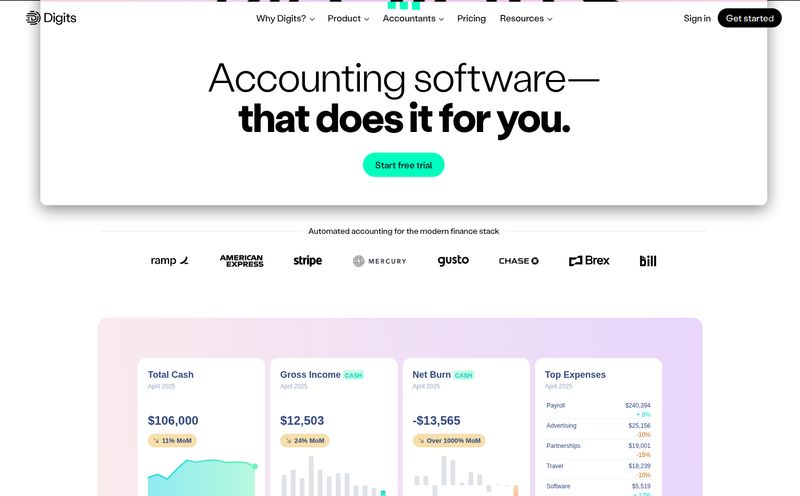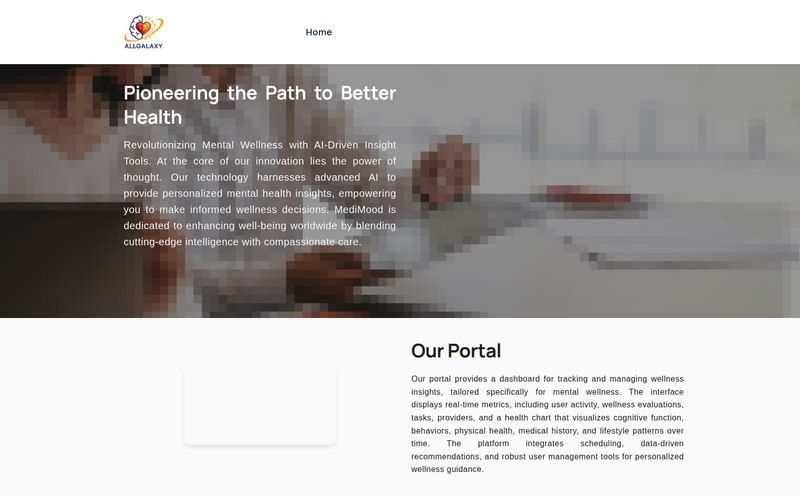We've all had that little pang of guilt. You're swamped at work, the kids are running wild, and you suddenly realize you haven't called your parents, or your grandma who lives alone, in a few days. You know you should, but life just… gets in the way. It’s a modern-day dilemma, this constant tug-of-war between our busy lives and the desire to stay connected with the people we care about most.
So when I stumbled upon a tool called Heartbeat, the premise immediately caught my attention. It’s an AI-powered service designed to automatically call your loved ones, have a chat, and then report back to you on their well-being. It sounds like something straight out of a sci-fi movie, right? A friendly robot companion for your family. The idea is both fascinating and, I’ll admit, a little unsettling. I had to know more.

Visit Heartbeat
So, What Is Heartbeat AI Anyway?
At its core, Heartbeat is a peace-of-mind service. It uses what it calls “empathic AI voice models” to place regular, friendly phone calls to whomever you designate. Think of it as an automated wellness check, but one that aims to feel less like a robocall and more like a genuine conversation. The goal isn't just to see if they pick up the phone; it's to get a real sense of their mental and physical state.
You, the user, get to set the topics for discussion and the frequency of the calls. After each check-in, Heartbeat generates a detailed report for you, giving you insights so you can take informed action. Maybe your dad sounds a bit down, or your aunt mentions she’s been feeling tired. The system is designed to catch these subtle cues.
How Does This AI Companion Actually Work?
This is where things get interesting. It's not just a simple script. The platform seems to be built on a few key pillars that set it apart from, say, a simple calendar reminder to “Call Mom.”
Empathic AI Voice Calls
The biggest claim here is the use of “empathic” AI with real human voices. We’ve all been on the receiving end of those dreadful, monotone robocalls. They’re awful. Heartbeat aims for the opposite. The idea is to have a conversation that flows naturally, using an AI that can supposedly understand tone and sentiment. This is the secret sauce. If the voice sounds robotic or the conversation feels clunky, the whole thing falls apart. The goal is connection, not interrogation.
The Power of Customization
One feature that I think is pretty smart is the ability to customize the call scripts. This isn't a one-size-fits-all solution. You can guide the conversation towards topics that are relevant to your loved one. Are you worried about their social life? You can have the AI ask if they’ve seen any friends lately. Concerned about their diet? The script can gently inquire about what they had for lunch. This level of personalization makes the check-ins feel a lot more meaningful and less generic.
The “Heartbeat Score” Explained
After a call, the system analyzes the conversation—the words, the tone, the hesitations—and generates a “Heartbeat Score.” It’s essentially a snapshot of emotional and physical well-being. Now, I’m always a bit skeptical of reducing human emotion to a single metric. But, as a quick-glance indicator, I can see the appeal. It’s like a weather report for your loved one’s mood. It’s not the whole story, but it tells you if you should expect sun or storms.
Real-Time Alerts for Peace of Mind
This is probably the most practical feature. If the AI detects something concerning during a check-in—like signs of distress, loneliness, or a potential health issue—it sends you a real-time notification. This transforms the tool from a passive reporter to an active alert system. It’s that digital tap on the shoulder saying, “Hey, you might want to call them yourself. Now.” For anyone living far from their family, this could be a game-changer.
My Honest Take: The Good, The Bad, and The AI
Alright, let's break it down. I've been in the SEO and tech space for years, and I’ve seen countless tools promise to revolutionize our lives. Some do. Most don't.
What I really like about the idea of Heartbeat is the proactive approach to care. It’s a safety net. It offers a layer of connection that, while artificial, could genuinely help people feel less alone and give families immense peace of mind. It’s a modern solution for a modern problem. In a perfect world, we'd all have time to call every day. But this isn’t a perfect world, and sometimes a little help is better than no help at all.
However, I've got some serious reservations too. The effectiveness of the entire system hinges on the AI's accuracy. If the sentiment analysis is off, it could create false alarms or, even worse, miss real problems. And that leads to the bigger philosophical question: can an algorithm truly replace human empathy? I don't think so. A call from an AI, no matter how sophisticated, will never be the same as hearing your child's or grandchild’s voice. It’s a supplement, not a substitute. And we should never forget that.
Then there’s the privacy elephant in the room. This tool is, by its very nature, collecting incredibly sensitive data. Recordings of conversations about health, mood, and personal life. The company would need iron-clad privacy policies and data security. The potential for misuse, as with any data-gathering tool, is something that gives me pause.
The Mystery of Pricing and Availability
So, you’re probably wondering, “How much does this cost?” And that’s where this story takes a weird turn. As I was researching for this article, I tried to go to their website. And… nothing. Just a “Site Not Found” error. I tried multiple times. It seems the site is currently down or no longer configured.
This could mean anything. Maybe they're in a closed beta. Maybe they're rebranding. Maybe the project has been paused. Whatever the reason, it means that right now, there is no public information on the pricing or availability of Heartbeat. It's a bit of a ghost. An interesting concept that seems to have vanished, for now.
Frequently Asked Questions about AI Well-Being Monitors
Is a tool like Heartbeat a replacement for calling my parents myself?
Absolutely not. And I can't stress this enough. Think of it as a safety net or a conversation starter. It can provide daily reassurance, but it can never replace the genuine emotional connection of a call from you. It's an 'and', not an 'or'.
How would a tool like this handle user privacy?
This is a major concern. A reputable service would need end-to-end encryption, clear data ownership policies (the data should be yours, not theirs to sell), and transparent terms about how the voice and conversation data is used and stored. Always read the privacy policy before signing up for such a personal service.
What happens if the AI detects a serious medical emergency?
This is a critical operational question. A well-designed system should not try to be a medical device. Its role would be to alert the designated family member or contact immediately. It should be programmed to say, “I think you should call [Family Member] right away,” rather than trying to diagnose a problem itself.
Is the AI voice actually convincing?
This is the million-dollar question. AI voice technology has gotten scarily good. Just look at platforms from companies like ElevenLabs. It’s possible to create voices that are nearly indistinguishable from humans. The success of Heartbeat would largely depend on whether they could nail this, making the interaction feel warm and natural instead of cold and robotic.
So, is Heartbeat available to use now?
As of late 2023, it appears the platform is not publicly accessible. The website is down, which suggests it's either in development, on hold, or has been discontinued. We’ll have to wait and see if it resurfaces.
Final Thoughts on the Future of AI Care
Heartbeat represents a fascinating, if controversial, step into the future of how we use technology to care for one another. The concept is born from a place of love and anxiety—the desire to be there for our family even when we physically can't be.
While the tool itself is currently a bit of a mystery, the idea behind it isn't going away. We're going to see more and more AI integrated into elder care and mental wellness. The key will be to embrace these tools for what they are: powerful assistants that can help us, but not replace us. They can be the extra eyes and ears, the safety net, the conversation starter. But the heart of care—the empathy, the shared history, the love—that will always be human. And frankly, I hope it stays that way.
References and Sources
As the official Heartbeat website is currently unavailable, this analysis is based on publicly available information and descriptions of the product concept. For more on AI voice technology, you can refer to research and products from industry leaders like ElevenLabs, and for discussions on AI ethics in healthcare, resources from institutions like The U.S. Department of Health and Human Services are a good starting point.



